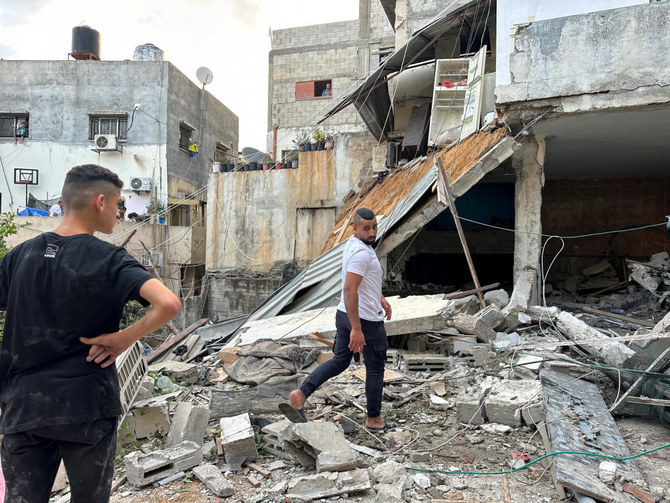RAMALLAH, Palestinian Territories: Israeli forces shot dead two Palestinians in a pre-dawn raid in the West Bank Sunday, the Palestinian health ministry said, as the army confirmed it carried out “counter-terrorism” activity in the occupied territory.
Violence linked to the Israeli-Palestinian conflict has surged since early last year, particularly in the West Bank, where the latest deaths bring to eight the number of Palestinians killed in Israeli incursions since Tuesday.
“Two Palestinians were killed by live Israeli bullets to the head” in the town of Tulkarem, the ministry said, while the army confirmed a soldier had been “moderately injured by gunshot fragments” during clashes in Nur Shams refugee camp near the town.
The Palestinian health ministry identified the two killed as Osaid Abu Ali, 22, and Abd Al-Rahman Abu Daghash, 32.
Ibrahim Al-Nimer, a resident and representative of the Palestinian Prisoners’ Club advocacy group in the camp said the “two were civilians.”
“The army entered the camp after 2:00 am... and demolished streets and some houses in the camp,” Nimer said.
Troops dismantled an “operational command center” inside a building in the camp and also uncovered a large number of explosive devices including gas-based explosive devices, the army said in a statement.
“During the activity, suspects opened fire and hurled explosive devices at the forces who responded with live fire,” the army said.
In recent months, there has been a surge in such military raids and a rise in Palestinian attacks on Israelis, as well as an increase in West Bank settler attacks against Palestinians.
Israel has occupied the West Bank since the Six-Day War of 1967.
Excluding annexed east Jerusalem, the territory is now home to around 490,000 Israelis who live in settlements considered illegal under international law.
The Palestinians, who seek their own independent state, want Israel to withdraw from all land it occupied in the Six-Day War and to dismantle all Jewish settlements.
However, the hard-right coalition government of Israeli Prime Minister Benjamin Netanyahu has pushed forward settlement expansion. Among the government members are settlers, including extreme-right National Security Minister Itamar Ben-Gvir.
At least 241 Palestinians have been killed in the Israeli-Palestinian conflict so far this year.
The bloodshed has also seen 32 Israelis, a Ukrainian and an Italian killed over the same period, according to an AFP tally based on official sources on both sides.
They include, on the Palestinian side, combatants as well as civilians and, on the Israeli side, mainly civilians including minors and three members of the Arab minority.
In recent days, unrest has also surged in the Israeli-blockaded Gaza Strip, with Palestinians holding daily protests that have turned violent along the border with Israel.
On Saturday, the Israeli army carried out a drone strike after violent protests in which three Palestinians were wounded by Israeli fire.
The strike was one of a series that have come amid protests at the border by Palestinians after Israeli closed the Erez crossing, the only one into Israel from Gaza.
Saturday’s strike targeted “a military post belonging to the Hamas terrorist organization,” the army said, referring to the Palestinian militant group that controls the Gaza Strip.



























